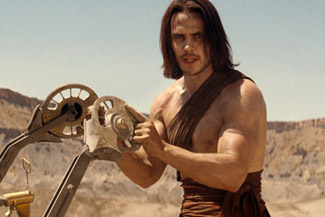Book vs. Movie: John Carter
By Russ Bickerstaff
March 14, 2012
In this corner: the Book. A collection of words that represent ideas when filtered through the lexical systems in a human brain. From clay tablets to bound collections of wood pulp to units of stored data, the book has been around in one format or another for some 3,800 years.
And in this corner: the Movie. A 112-year-old kid born in France to a guy named Lumiere and raised primarily in Hollywood by his uncle Charlie "the Tramp" Chaplin. This young upstart has quickly made a huge impact on society, rapidly becoming the most financially lucrative form of storytelling in the modern world.
Both square off in the ring again as Box Office Prophets presents another round of Book vs. Movie.
A Princess of Mars
Somewhere in the early 20th Century, a guy name Edgar Rice Burroughs was having some difficulty with his business prospects. Things just weren’t working out for him and he had a wife and kids to support. He was in his mid-30s in the summer of 1911 when he began to write fiction, surmising that he could write every bit as awful as most of the authors who wrote for pulp fiction publications. If normal business doesn’t work out you can always fall back on work as a fantasy author. This wasn't the most rational line of thinking (it's downright backwards, in fact), but Burroughs made it work in a very big way.
One hundred years after he began work on what was to become Princess of Mars, Burroughs’ work is hugely successful and immensely influential in the world of genre fiction. While he may not necessarily have originated every idea in the book, nearly every element of Burroughs’ Princess of Mars has appeared elsewhere in nearly every major market sci-fi movie from Star Wars to Avatar. So, it’s only natural that the film would be adapted into a major big-budget motion picture. Can a 100-year-old fantasy pulp fiction story still resonate with today’s audiences? Here’s a look.
The Book
The novel begins as an account that had been passed on to Burroughs personally. It's kind of a cute intro to what quickly becomes fantasy. John Carter, a Confederate veteran of the Civil War, has found a vein of gold. He’s run into some kind of trouble with the local natives and he attempts to get away from them by hiding in a sacred cave. Things get kind of weird from there. He is mysteriously transported to Mars. He knows for a fact that it is Mars. There is no question in his mind that it is Mars. So he gets up to look around and promptly finds out that, in the light gravity of Mars, he’s immensely strong and can jump ridiculously long distances.
Okay, so the science here is really, really suspect. Burroughs was a business man who had a love of storytelling. (The man ended up writing dozens and dozens of novels in an era before the electric typewriter. You didn’t do that if you didn’t love storytelling.) He didn’t have a whole lot of experience with science, though. In an era before we had grainy video of astronauts bouncing around on the moon, the idea of microgravity probably seemed really, really fantastic. And it’s used as a device here to make one man seem almost godlike in what is a very, very dangerous world.
Continued:
1
2
3
|
|
|
|




